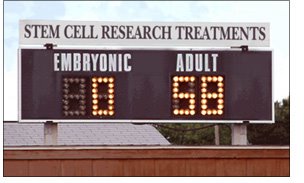Same Ten Commandments -- Different Outcome
by Bruce Hausknecht, judicial analyst, Citizenlink.org (12/20/05)
SUMMARY: An appeals court rules an Ohio display is constitutional.
The 6th U.S. Circuit Court of Appeals upheld a courthouse display today which is essentially identical to the one struck down by the U.S. Supreme Court in last summer's McCreary County case. The difference turned on religious motivation -- or in this case, the lack thereof.
The decision was notable for its rejection of the ACLU's argument that the ACLU was offended:
"And the ACLU, an organization whose mission is 'to ensure that . . . the government (is kept) out of the religion business,' does not embody the reasonable person," the opinion read.
Then the court went on to kick a hole in the old "separation of church and state" mantra:
"The ACLU's argument contains three fundamental flaws. First, the ACLU makes repeated reference to 'the separation of church and state.' This extra-constitutionalconstruct has grown tiresome. The First Amendment does not demand a wall of separation between church and state."
And, reasonably enough, the court said that a public display of the Ten Commandments does not equal a government endorsement of religion:
"We will not presume endorsement from the mere display of the Ten Commandments. If the reasonable observer perceived all government references to the Deity as endorsements, then many of our Nation's cherished traditions would be unconstitutional, including the Declaration of Independence and the national motto."
"The Mercer County display has a secular purpose. Unlike McCreary County, there is nothing in the legislative history or implementation that tends to prove a religiouspurpose. Nor does the display have the effect of endorsing religion. The display is therefore constitutional as a matter of law."
Now, if someone could just explain to me how identical displays in separate counties should constitutionally receive different treatment because of the subjectiveintent of the people that authorized them, then -- well, never mind, it's not really explainable.



